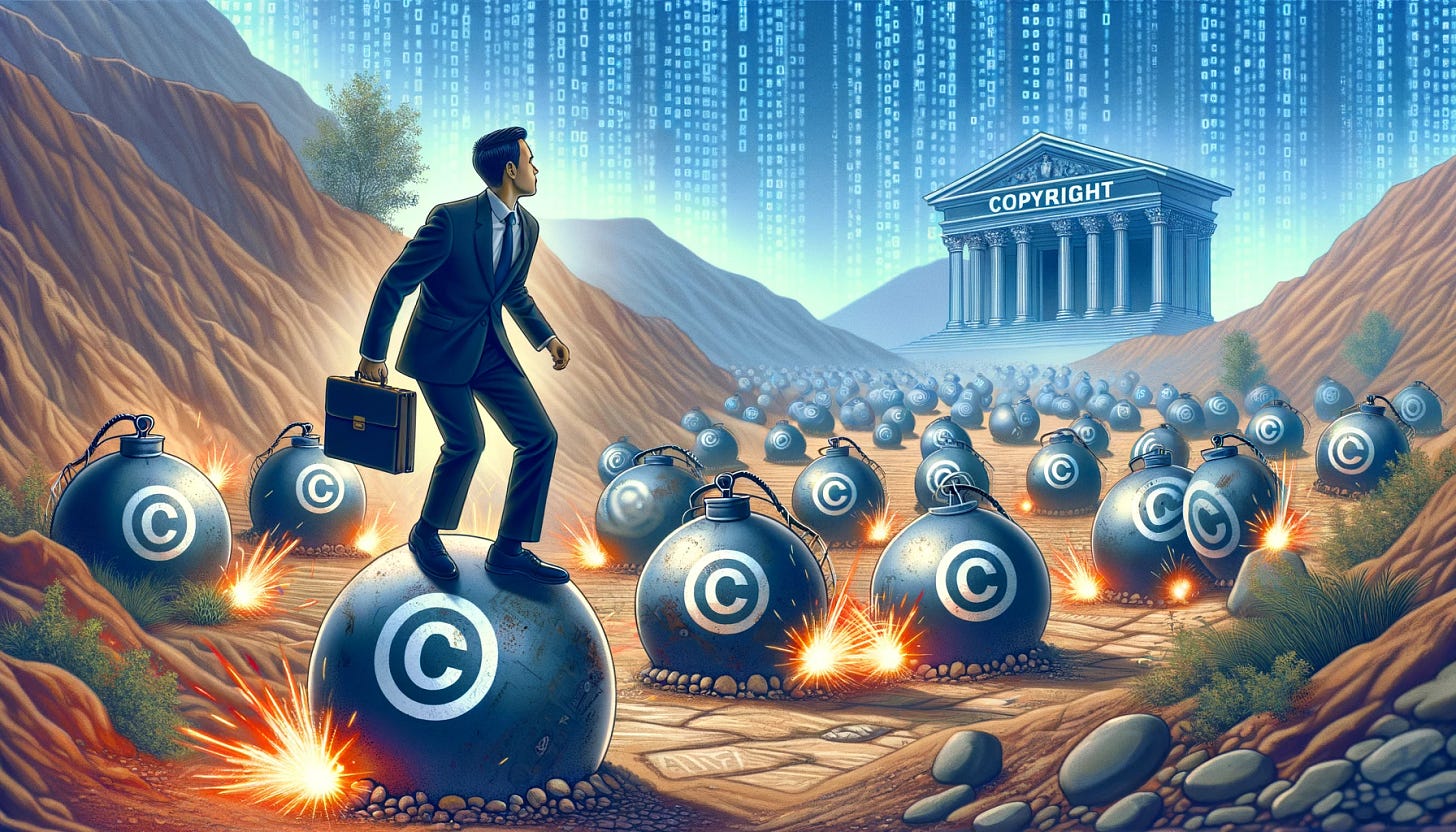Navigating the AI Marketing Copyright Minefield
As marketers eagerly embrace AI, a critical ethical and legal dilemma looms: copyright and intellectual property (IP) issues surrounding AI-generated content.
Marketing is a dynamic field that requires constant adaption to emerging technologies. Paramount among them is generative AI — a game-changing technology that could alter the face of content production and personalized advertising forever.
But, as marketers eagerly embrace these cutting-edge technologies, a critical legal and ethical dilemma looms large: copyright and intellectual property (IP) issues surrounding AI-generated content. Understanding the potential risks and navigating this minefield with caution is crucial.
At the heart of this challenge lies a fundamental question — who truly owns the rights to content generated by AI systems?
As AI models become adept at producing human-like text, images, videos, and more, the lines between human creativity and machine output have blurred, leaving marketers facing complex copyright implications. Understanding where AI-generated content falls under copyright law is critical since violations could lead to costly litigation and damage a brand's reputation.
The ‘Fuzziness’ Surrounding Proprietary Data & AI
Adding complexity to this issue is the need for more transparency around the precise training data ingested by large language models (LLMs) like ChatGPT. While AI companies assert they aim to respect IP rights and obtain proper licensing, the sheer scale of data required for these models makes it likely that LLMs have ingested publicly available copyrighted text. However, the extent could be clearer.
This opacity makes it difficult for marketers to conduct full due diligence to ensure they are not inadvertently exposed to copyright risks when leveraging AI-generated content. Increased transparency regarding data sources would allow more informed decision-making.
The Copyright Ownership Conundrum
Understanding the role of AI in content creation is crucial to navigating the copyright ownership dilemma. One perspective argues that since AI models ultimately follow instructions and data provided by humans, any generated output should belong to the marketer or company operating the AI.
This view emphasizes the AI's reliance on human input for context, making it a tool rather than a creator. However, this perspective fails to consider the AI's role in analyzing data and generating novel outputs beyond simply following instructions, which could potentially grant it a claim to authorship under copyright law.
An opposing view contends that the AI should be considered the author or creator, given its ability to analyze vast datasets, identify patterns, and synthesize new original works.
This raises questions about whether machines can be deemed "creative" enough to hold copyrights. From this perspective, the human operator provides high-level guidance while the AI does the actual generative work, potentially giving it a claim to authorship under copyright law.
Using Copyrighted Data to Train AI
Another major issue is the use of copyrighted materials to train AI models. Many AI systems ingest massive datasets containing copyrighted text, images, videos, and more from various sources — including competitors' marketing assets. While snippets are only used for training and not directly replicated, there are concerns this could constitute copyright infringement.
AI Outputs Resembling Copyrighted Works
In some cases, AI-generated marketing content may closely resemble or even inadvertently replicate existing copyrighted works due to the nature of the training data. For instance, an AI churning out product photography could generate images strikingly similar to a competitor's copyrighted visuals.
This scenario raises complex questions about derivative works versus transformative fair use. Should we consider the AI output derivative work (which would be covered under the original copyright)? Or does it represent a transformative creation that would fall under fair use exceptions?
The bottom line is that we urgently need clear policies and legal precedents. AI's rapid emergence in marketing has left marketers and legal bodies scrambling to keep up. Until we can thoroughly examine and clarify the relevant issues, we’re saddled with an alarming lack of clear industry guidelines governing copyright and IP implications.
Commercial Use of AI-Generated Content
Beyond creative works, the commercial use of AI-generated marketing content carries additional copyright risks. As businesses explore AI for content, advertising, branding, and more, they must consider appropriate licensing and permissions.
For example, if a company generates promotional content using an AI trained on competitors' copyrighted data, could they face legal action for infringement? This lack of clarity creates significant uncertainty for businesses leveraging AI marketing technologies.
Guidance for Ethical AI Use
As this murky ethical landscape evolves, marketers must prioritize the following principles:
Transparency: Clearly disclose when marketing content is AI-generated to avoid deceptive practices. Consider using disclaimers, such as “any resemblance to copyrighted works is inadvertent and unintentional.”
Prioritize privacy and ethics: Wherever possible, observe data privacy laws and guidelines, obtain proper permissions, and anonymize personal information used to train AI systems.
Respect IP rights: Exercise thorough due diligence to avoid infringing on copyrights, trademarks, or other IPs. Obtain licenses and permissions when required.
Avoid unfair competitive practices: Do not use AI technologies in ways construed as unfair competition, such as repurposing competitors' content as training data.
Develop Internal Policies: Implement robust policies governing the ethical and legal use of AI, addressing copyright, privacy, and other key issues. Prioritize proper vetting of any third-party AI tools’ data sources and licensing.
Foster collaboration: Engage with industry associations and stakeholders to develop ethical AI principles and contribute to shaping future guidelines.
Maintain human oversight: Uphold human review processes to ensure the organization observes copyright laws and ethical standards in its AI-generated marketing content. Your role in this process is crucial.
The Path Forward
The content supply chain for many AI marketing technologies is essentially a black box filled with copyrighted works of uncertain provenance. Combine this with the general ambiguity around IP ownership of machine-generated outputs, and we will have a situation ripe for legal chaos.
As this ecosystem rapidly evolves, marketers must stringently prioritize transparency, ethics, and vigorous compliance with IP laws. Widespread adoption of AI language models that inadvertently build upon plagiarized data could lead to devastating betrayals of public trust.
By championing transparent AI governance and responsible practices, the marketing community can pave the way to leverage these innovative technologies without compromising ethical standards. Attempting to cut corners or turning a blind eye to copyright infractions could ultimately undermine marketing efforts.
The way forward requires a proactive, unified approach across marketing, tech, and policy spheres. We must have difficult conversations and develop new frameworks for this complex copyright landscape. The alternative is a future where AI disruption breeds legal pandemonium — a fate the marketing world cannot afford to ignore.
Who owns the copyright to AI-generated content? Leave a comment to share your thoughts on this vitally important topic.






